Maidan in French
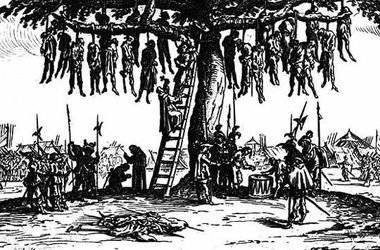
It all started with a sling game! That's what can bring civil confrontation, if you play. Now the French call that era the fun word "Fronda"
What is happening in Ukraine today is terrifying for many. Shootout between militants and Berkutovtsy on Khreshchatyk. Captures office buildings. The first dead and endless negotiations between the opposition and the president at a time when ordinary people are waiting for an early resolution of the political crisis. Many ask me: when will THIS end? How to say. Our country got stuck again HISTORY. Now you have to not complain about the absence News. How long? Future will tell. For example, France in the very middle of the XVII century lived in such a situation unhealthy for five whole years! All that remained of her was the cheerful name La Fronde (Fronde) and the novel by Alexander Dumas “Twenty Years Later”. As if nothing bad had happened!
Translated "fronda" means "slingshot", "sling." The famous uprising got its name from the fact that the Parisian boys at the beginning of it shot at the royal soldiers with slingshots, lurking around the corner. The explanatory dictionary, besides the direct meaning, gives another, figurative: “non-fundamental, not serious opposition for personal reasons”. Wow frivolous! People laid thousands! They made a real civil war. They took and handed over Paris. And then, in a frivolous manner, they gave up their hand in French and got rid of the nightmare with one funny word “Fronda” ...
However, the French can be understood. Unhappy, deprived of God. One war they called the Hundred Years. The other is Thirty Years Old. And if we consider that in 1648, many in France have not yet departed from the era of religious wars (the ones with the St. Bartholomew night!), Which was closer to them than the Great Patriotic War for us today, then you can understand why, after surviving the Fronde , d'Artagnan's contemporaries did not feel anything special. Like, carried by - it could be worse. Meanwhile, the parallels with our present day at the Fronde just amazing.
Ukraine is no wonder compared to France. But in the middle of the XVII century, this country was particularly similar to the current Ukraine. Although not. She was still much more confused and worse. Residents of neighboring states considered it to be a wildly less civilized country inhabited by semi-barbarians. There was no great French literature yet. And philosophy. And architecture. Unpaved narrow streets of Paris stank of mud. Of the roads in the whole country, the best were the ancient Romans, numbering at least fifteen hundred years. For the rest it was not to pass, not to pass! There, behind each bush on the side of the road, sat on a wolf waiting for Little Red Riding Hood.
Residents spoke different languages and poorly understood each other. Something similar to the current French language existed only in the capital. In the north of the country they spoke in the language of "Oyl", and in the south in the language of "ok" - both that and the other word meant "yes." Moreover, they mostly spoke, but did not write, because of almost complete illiteracy. However, in many villages there existed their own, generally no one else understandable dialects.
FRANCE WITHOUT FRENCH. The inhabitants felt not French, but Bretons, Picardians, Burgundians. Flourished prosperity and cronyism. The same musketeers (an analogue of our “Berkut”) were staffed mainly from Gascons - descendants of the Basques who inhabited the south of France. Gascons pulled each other to Paris and captured the most delicious places in the system, as they would say now, “maintaining public order”. With them, and fed.
The rest of the provincials sincerely hated Paris, which sucked all the juices out of a peasant country, and considered it to be cured. Moreover, in the north of the country with hunger had to eat frogs, and in the south - snails. From such a miserable life, both the snail and zhaboedy fled across the ocean - into the newly opened Canada, becoming quite wild feers for fur - trappers (analogous to our Cossacks). And those that stayed at home, in spite of each other, professed two competing religions - Catholicism and Calvinism (a kind of Protestantism). Both Christian communities were in such "love" that from time to time they organized mutual slaughter.
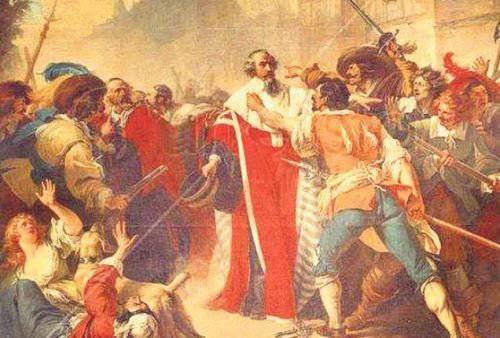
It came to this. The people in Paris expressed dissatisfaction in the most active way.
In general, if there was a truly divided and unsettled country in Europe, it was France. Some people even did not consider it a country. For example, the Spaniards wanted to chop off the entire south - the one that spoke the language “ok”, very similar to Catalan and Castilian in Spain. And the British did not consider the Hundred Years War to be completely lost and were still going to return to France to pick up "their own" - all those areas where the oil prevailed and the frogs cracked.
But the Parisians were also unhappy, although they somehow lived better than anyone! They suffered from the so-called "capital complex" and believed that they all owed - the king and the province, but did not like to pay taxes and constantly hid the business "in the shadow". And since among the Parisians there were more literate people, their main entertainment was to read satirical anti-government pamphlets and leaflets, the authors of which "troll" power. These leaflets were analogous to the modern Internet.
While Louis XIII and his first minister, Cardinal Richelieu, were hard-handed in France, the country was still holding onto a wallet. For all the separatists and conspirators, the cardinal without hesitation hacked heads on Grevskaya Square in Paris, regardless of social origin. The king, without hesitation, supported the policy of his first minister in everything and claimed death sentences for the rioters, even when they were people from his closest entourage - for example, the main horseman, Saint-Marc, who decided to remove Richelieu. This "royal duty" Louis XIII willingly performed, despite the fact that, according to the modern French historian Emile Manya, "wrote like a child in large, uneven letters, and nothing about spelling and say nothing."
TAKE-ALL! But in 1642 and 1643, the king and his first minister died one after another (first Richelieu, followed by Louis), and the country found itself in a strip of relative freedom. The young Louis XIV, when his father left for the better world, was only five years old. The rules instead of her mother - Queen Anna of Austria (a forty-two-year-old woman still in full juice, with an insatiable appetite both at the dinner table and in bed) and her lover - Cardinal Mazarin. In addition to making love, this couple especially liked to raise taxes.
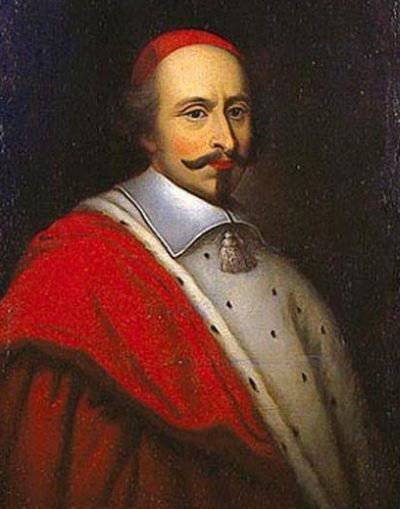
Premier Mazarin was disliked, although he had administrative powers and was promoted by the great Richelieu
And then the French people became terribly excited. “But who are these Anna of Austria and Cardinal Mazarin? - began to resent the French. - Where did they come from on our head? We ourselves are not done with a finger! ”The Parisians, who had been reading street leaflets with“ criticism ”of the cardinal — the so-called mazarinad, were especially fuming. They were noisy just like in the bazaar.
The fact that the queen and her intimate friend were foreigners also added fuel to the fire: Anna, despite her nickname, was Spanish, and the cardinal was Italian. And no one wanted to remember what Mazarin did to the cardinal Mazarin the late Richelieu, who noticed the administrative talents of the nimble Italian, and the queen the queen - Louis XIII, who, as soon as he died, suddenly began to remember everyone with nostalgia and even write on the walls: “Louis, come back! "
The first power of the world at that time was Spain, which played the role of the United States in international relations. It was she, not Britain, who owned the sea, her garrisons stood in Flanders (present-day Belgium) and Sicily, controlling sea routes, and her galleons carried barrels of gold and silver from the Indians from South America. As the United States now imposes "democracy" everywhere, then Spain sought to instill Catholicism in Europe as the most correct teaching, guaranteeing both lifetime and posthumous bliss. All French "truth-lovers" had a habit of running to the Spanish embassy for instructions and support - as we would say today, for "grants" for which it was possible to issue another batch of "Mazarinad." There were quite a few such “foreign agents” in France, the blessing of gold from Spain was enough.
BUNT OLIGARCHS. But the most important foreign agents were the "princes of blood" - an analogue of our oligarchs, who consisted of the royal family of France in varying degrees of kinship. Princes received the best positions, became governors of French provinces speaking different languages, but each of them wanted to be the first minister instead of Mazarin, and he was very afraid that the “family” would take everything for himself. The princes of blood also grumbled and ran to the Spanish embassy, and sometimes, especially intrigued, washed away abroad - into emigration, like some Ukrainian offended oligarchs.
In January, 1648, this sweet political system boiled like onion soup.
Anna of Austria and Cardinal Mazarin decided to introduce a new portion of taxes to bring the war against Spain to the end - France, imagine, she also fought with her! But the Parisian parliament refused to approve them (Madril’s hand was felt!) And went into a deaf opposition to the government. The president of parliament Pierre Brussel, an extremely stubborn type and a dangerous schemer, was particularly rampant. Using his official position, he refused to register royal decrees that introduced new taxes. Sly Brussels sniffed the Chamber of indirect fees and the Accounts Chamber and, as Anna Austria of Austria said in the hearts, created his own “republic within the state”. Paris boys, heated by adults, began to shoot slingshots around the windows of the queen's supporters - an analogue of Avtomaydan.
Then Anna of Austria ordered the arrest of Brussels, which was successfully done. In response, the Parisians set up barricades - right away 1260 pieces. The day they did this, and entered into French history. He was called - Day barricades. The capital has become completely impassable. Even the excreta (and removed them from Paris, due to the lack of sewage, in conventional barrels) became impossible to remove. So everything was fragrant - the SPIRIT of FULL FREEDOM.
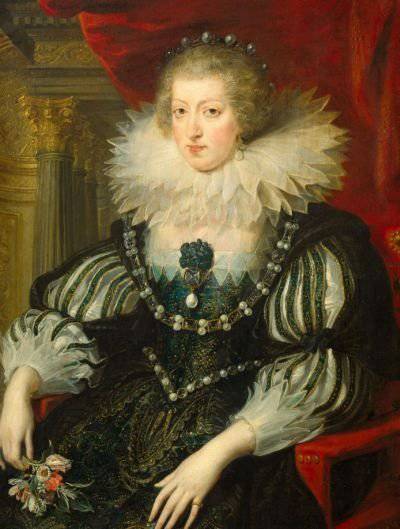
Queen Anna of Austria first arrested the main oppositionists, and then - released
The most piquant is that it is from these cesspool barrels, as well as empty wine (Parisians Nemer drank!), Most of the barricades and was built. Why not from cobblestones? And because, as I wrote above, no one was paving the street in the French capital. They were not much different from rural roads. I had to build fortifications from barrels. "Barrika" - in French "barrel". It is from this word that the “barricade” originated.
However, the excrement of the Parisians in the revolutionary activities, the application also found. Since the shit in Paris was just completely in his ears, he was also used to fight. Latrines in French le cabinets - "cabinets". Parisians dissatisfied with tax policy will sit down at the "cabinets", reading proclamations at the same time, throw out their indignation into the night pots, and then look out of the windows and wait for the royal guardsmen to drive up to the barricades to disassemble. And then they poured everything that they had accumulated in pots (compared to the wretched French province, the capital's inhabitants, I repeat, ate well!) From the upper floors of the oprichniki on their heads.
IN THE DAYS BARRIKAD. In the novel Dumas all these spicy details are not. There is a “war in laces”, where street battles are described like this: “With twenty musketeers, he rushed to the whole mass of people, who retreated in complete disarray. Only one person was left with an archway in his hand. He took aim at d'Artagnan, who carried himself with a career. D'Artagnan ducked to the horse's neck. The young man fired, and a bullet hit a feather on D'Artagnan's hat. The horse, racing at full speed, flew at the madman who was trying to stop the storm, and threw him to the wall. D'Artagnan abruptly laid siege to his horse, and while the musketeers continued their attack, he turned to the man who had been knocked down with a raised sword.
In reality, it turned out that there was simply no effective remedy against the barricades of smelly barrels and night pots with excrement from the government of Anna of Austria and Cardinal Mazarin. The barricades were the most advanced means of street warfare at that time - irreducible. No lace cuffs could not erase them.
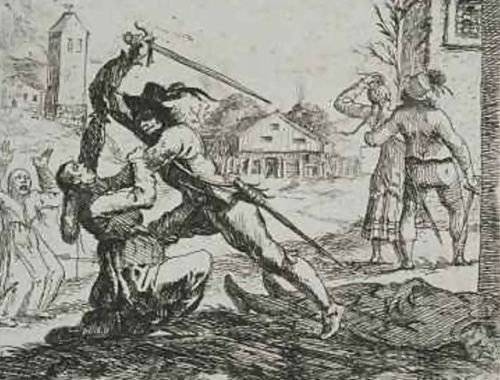
Just a civil war. Comparing itself with France, do we really want to repeat its mistakes?
NIGHT POT AGAINST FOODS. Only at the end of the next century, military theorists (by the way, all in the same France, addicted to anti-government "barricading") will come to the conclusion that you can fight the barricades with light assault guns and flanks right through the houses. But to such a simple truth in 1648, it was still very far away, and the guns were so heavy and cumbersome that they simply did not crawl into the narrow streets of Paris. Despite the presence of the best musketeers in the world, Anna of Austria was forced to give up - she released from prison Brussels and fled from Paris to the provinces. And even went to negotiate with the parliament, meeting all his requirements.
In Saint-Germain - a suburb of Paris - an agreement was signed between the queen and the rioters, which meant the actual surrender of legitimate authority. The Party of Night Gorshkov put the Sword Party on its shoulder blades. But this was only the beginning of the struggle.
In the XVII century. France was on the verge of collapse because of the game of "democracy".
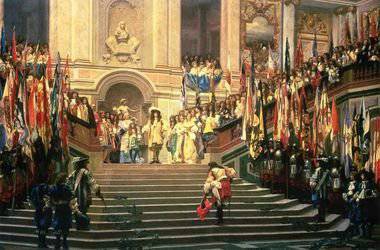
Humiliating finale. The main fronder Prince Conde did not suspect that he would bow to Louis XIV when he grew up in the Sun King. And I had to bow my head ...
The middle of the seventeenth century Paris did not like its kings. Kings answered him in return. Juvenile Louis XIV, on behalf of whom Anna of Austria and Mazarin ruled, was only the third ruler of France from the Bourbon dynasty. Their kind came from the south - from the kingdom of Navarre. This separate small state in the foothills of the Pyrenees was in vassalage relations with France.
As you know, the grandfather of Louis Henry IV "bought" his crown with the famous phrase: "Paris is worth the Mass." Previous dynasty stopped. Only the Catholic could take the throne, and the Protestant Heinrich, a cheerful, crude Southerner, smelling of garlic and another girl who he was rolling on straw in his “regional” kingdom, easily refused the religion of his fathers for the sake of the scepter and crown of France.
At the time of the Fronde, this story was well remembered. The Parisians considered the Bourbons to be upstarts, opportunists and impudent people who wanted to rake up everything for themselves. And the kings sought to live not in the Louvre, but in nature - away from their capital, which was constantly boiling with disturbances and barricades.
Pope Louis XIV, who ruled under the lucky number "13", spent all his free time on the hunt, moving from one royal castle near Paris to another. He was a master of all trades, remarkably did the keys and master keys, with which he climbed into other safes, and once, when his carriage broke an axis, he personally repaired it, just not to return to Paris, where artisans did not like it and tripped the king price Louis XIV, when the Fronde ends, will generally build Versailles - his own Koncha-Zaspa and Mezhyhiria at the same time, and he will come to the capital only occasionally to participate in the most important ceremonies. Even the foreign ambassadors this king will take in Versailles, in fact - at the "cottage".
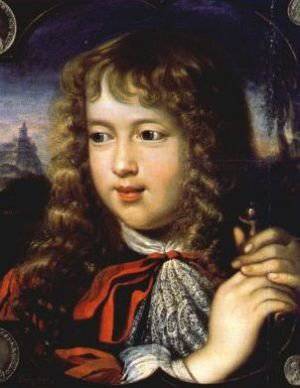
Baby Louis XIV suffered from the fear of the French oligarchs who dreamed of cutting his powers
Oligarchs "for the people"? But in the autumn of 1648, this was still very far away. To earn the right to freeze in a personal “mezhigorye”, one had to defeat the opposition, which barred Paris with barricades far and wide. The form of the Saint-Germain agreement meant the complete surrender of royal power to the rebels. But, in fact, neither the proud Spaniard Anna of Austria, nor her lover - the enterprising Italian Mazarin, who ruled on behalf of the kid Louis XIV, were not going to give up a single inch and expected to return everything that they had lost.
The French oligarchs - the very princes of blood, lightly pressed by the royal "family" - also bent their trump cards. The popular movement in Paris, warmed up by the money of the Spanish embassy, was incredibly pleased with them. In words, these rogues took the side of the “rebellious people,” as the ugly rebellion was called with pouring liquid excrement on the heads of the royal guardsmen, but in fact entered into secret negotiations with the government, seeking to bargain for the most delicious pieces of state pie.
The most enterprising "oligarch" among the opposition was Prince Condé, a young rich man who believed that candy was the most important thing in life. He literally cracked them with handfuls, and at the same time he loved to be in the thick of things and give various battles. And not without success. The Queen immediately outbid him and in fact made the first minister.
For some time it cooled passions. 15 March 1649 Parliament reached an agreement with the royal court. Parisians dismantled the barricades. A coalition government headed by Mazarin (from the king and his regent mother) and Condé (as if from the people) were set to work.
Restored activities and utilities. The strategic stocks of shit accumulated during the months of the uprising, which changed the course of French history, were taken in oak barrels to a landfill site. They literally surrounded the capital of beautiful France from all sides. Instead, water carriers in other barrels - clean - began to supply spring water to Paris, so that the Parisians would not eat it directly from the Seine, constantly risking picking up jaundice and dysentery.
GREAT CONFETOFIL. However, between Konde and Mazarin, an industrial conflict of two “ingenious” managers, the old and the young, immediately flared up. Officially, it would seem on the fundamental issues of state importance, but in reality - for money. The guys could not share the budget.
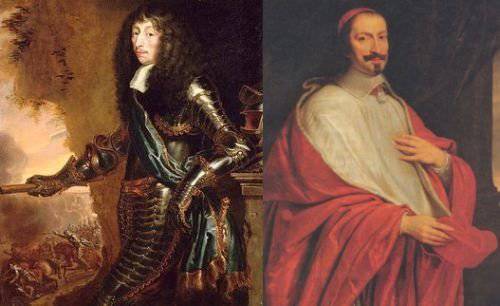
Ministers rivals. The "great" Conde and the "great" Mazarin did not fit in the same small Cabinet
Mazarin sought to retain funding to the royal guards, who represented the only real support of power. And Conde demanded to give out more to the people of various "candies", seeking to increase their own popularity. But it is only in words! In fact, the sly candy prince rowed everything himself. And all at an increasing rate.
Some "political scientists" (these pleasant people, commenting on all, were already then) whispered in their ears to the queen that Conde wanted to remain the only prime minister, while others went even further in their predictions. According to them, it appeared that Conde was going to finish off little Louis XIV and his younger brother - the harmless toddler of the Duke of Anjou - and he was going to climb the royal throne! After all, the Bourbon dynasty was very young and still, as they say, did not “sit”, and Condé also had some rights to the seat of the monarch in the state, where half of the inhabitants said the word “yes” as “oil”, and the other half - "OK", and at the same time did not understand each other.
Suddenly, there were supporters of Mazarin, offended by everyone - this Prime Minister owned official French to the same extent as our Azarov was a state Ukrainian, but was an experienced business executive. And let's face it, not a bad person. Mazarinofily opened even in the ranks of the opposition! After all, the greedy Konde did not share with them!
For example, the incredibly oppositional (just to stupid!) Young scuffle Duke Laroschoucoux unexpectedly confessed to Mrs. de Chevrez, who played the same role in France’s political system as in ours Mrs. Tymoshenko (under all regimes she was expelled outside the country , then they put in jail, and the late Cardinal Richelieu fainted at all when he heard her name!), that Azarov, excuse me, Mazarin was unjustly offended and could still serve France. After all, it is under him give foreign loans.
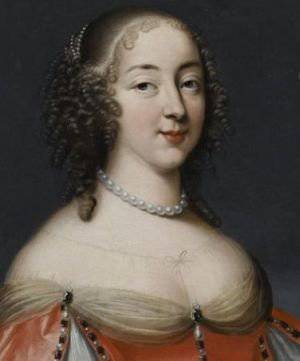
The Duchess de Chevreuse played the role of Yulia Tymoshenko in the Fronde. All the threads of intrigue led to her sexy personality.
WE DON'T APPRECIATE MAZARINI! In the memoirs of La Rochefoucauld, there is a corresponding record of his conversation with Mrs. de Chevrez, who was about to get out of the next “exile”: “I depicted to her, as far as I could, the state of affairs: told about the attitude of the Queen to Cardinal Mazarin and to herself; I warned that it was impossible to judge the court by her long-time acquaintances, and it was not surprising if she discovered many changes in him; advised her to be guided by the tastes of the queen, since she would not change them, and indicated that the Cardinal was not accused of any crime, and that he was not involved in the violence of Cardinal Richelieu; that perhaps he alone is well-versed in foreign affairs; that he has no relatives in France and that he is too good a courtier. I also added that it is not so easy to find people so famous for their abilities and honesty that they can be given preference over Cardinal Mazarin. Ms. de Chevreuse stated that she would unswervingly follow my advice. She came to court in this determination. "
I will not argue that Yulia Tymoshenko will be released from imprisonment, as Ms. de Chevreuse, but once again I wonder how everything repeats itself in world history. But if the same Tymoshenko will be pardoned by the president and will be free, then the trio of our main opposition figures in the person of Klitschko, Yatsenyuk and Tyagnibok will immediately fade before her brilliant shine, and I honestly do not dare to predict the further course of events and the success of their political career. But back in France since Mazarin.
Konde raised his tail not only to Mazarin, but also to the queen. And he immediately received a hat — more precisely, a hat with a beautiful ostrich feather. He was expelled, and then imprisoned.
All the other princes of the blood, without delay, came out in defense of the “unfortunate” lover of sweets. Instead of the parliamentary Fronde, the Parisians broke out its second series - the so-called Fronde of Princes. Here we were slaughtered cruelly!
Each of the princes had his own army of thugs, motivated both ideologically (only we are right, and do not care about the others!), And with money generously allocated by Spain to disintegrate the violent French kingdom. Everyone seemed to fall into insanity. Roads filled the gang of stray soldiers. Taverns were taken by storm. Wine shops and cellars seized instead of fortresses. The girls were raped. Old women and old people were killed for fun. Pedophiles hunted for children. Behind defenseless beauties are maniacs, similar to what is described in Suskind's novel The Perfume. Nobody in the world recognized the French. They may have had a bad reputation as half-savvy, ready to kill each other for any reason, but nobody expected such savagery from the inhabitants of the “non-existent” state. And all this was called the fun word Fronda - Playing in the sling!
Events have begun that are difficult to describe. Queen released from prison Conde. He instead of gratitude immediately rushed into the fray, hurrying to quickly bloody his sword. Opposition and power gave real field battles under the roar of guns and the rustle of flying banners. The battles started off beautifully, according to all the rules of the “war of laces”, but nobody wanted to remove the corpses - everything that the dogs did not have time to eat was decomposed in the sun, so even the perfumery maniacs temporarily stopped infringing and running in all directions, holding their noses.
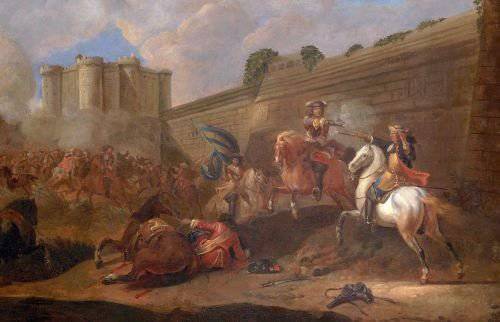
Battle of Paris The game "in the sling" went serious - they perforated each other with pistols mercilessly
MAYDAN FOR THREE YEARS! In such a life-threatening entertainment, France spent as much as three years! Parliament decided that foreigners are not entitled to hold public office. Cardinal Mazarin then ran out of the country, then returned again. Foreign banks demanded repayment of loans. Economic life has stopped. Exports stopped. Import too. Traditional French cuisine has lost all its most important ingredients. All wine from the cellars was drunk and all grain stocks were eaten. Even the snails and frogs disappeared somewhere (to be honest, they were simply eaten to the last), and the mice hung themselves from hunger in empty barns. Not even an onion for the onion soup. The cold hand of Holodomor took the belly of the "little Frenchman." Thought prompted: "It's time to put up!". Selfishness whispered: “Do not give up! The hero must stand to death! Like Joan of Arc! ”
From what is happening, only the Spaniards benefited. All the money given by the opposition to the “revolution” still returned to Madrid, since the “oppositionists” bought for them weapon - all from the same Spain. After all, even the release of musketeer swords stopped in France. The blacksmiths fled, and the mining of ore stopped because of the permanent civil war of all against all.
And all survivors - AMNESTY. And then, as if grace descended on the kingdom forsaken by God. Someone in Paris, where it all started, threw a cry: "Enough!". The warring parties made mutual concessions. The queen once again dismissed Mazarin. The parliament dismissed several of the most rabid deputies who did not want to calm down. Prince Condé was simply spat, advising him to go to the ancestral castle - to put it simply, to the village from which he was born, and there to engage in a more peaceful affair - for example, to feed the geese. People who yesterday were ready to give their lives for the “great Conde” (under this name he appears in history) now could not even understand why they were so boiling because of such an insignificant person.
Konde did not want to give up. But several fortresses, still under his control, capitulated to the royal troops, as soon as the opposition ended their salary for them - after all, the treasury of Spain was not unlimited.
The only plus was the fact that the inhabitants of different parts of France as a result of civil strife got to know each other a little better and realized that a thin world is still better than a good Fronde. At least by the fact that during the world murder is considered a crime, and during the Fronde it is a feat. The Burgundians, Provenceals, Picardians, Gascons, and even the arrogant Parisians with their ineradicable metropolitan complex for the first time became aware of themselves as part of one people. Albeit very unlike himself in different areas of a large country.
In order not to incite passions, the royal government showed unprecedented so mercy. No executions, as in the days of Richelieu. Universal AMNESTY for all leaders and participants in the uprising. The old men, who remembered how it was during the days of the Religious Wars, even wept with emotion. After two hundred years, the tragedy experienced by France seemed ridiculous. Fronda, they say that to take from her ... Something frivolous. And Dumas even wrote his “Twenty Years Later”, making an eerie, if not a joke, era with a cheerful flashlight to continue the adventures of the “Three Musketeers”. And took, as usual, the cashier. Well, could it have occurred to the fronders that they cut the tribesmen for the commercial success of the novels of some brisk "Negro" (in reality - Quarteron), whose grandmother was from distant Antilles?
Information